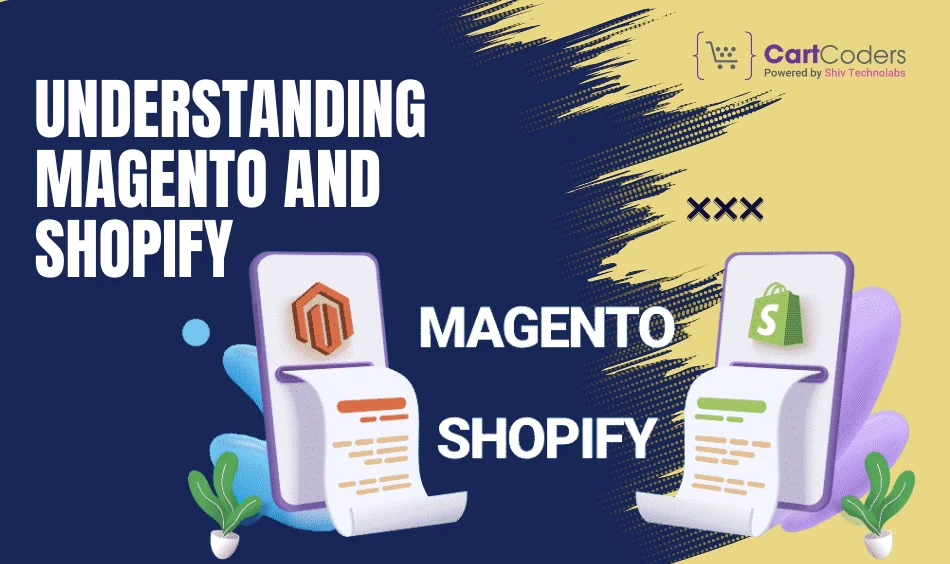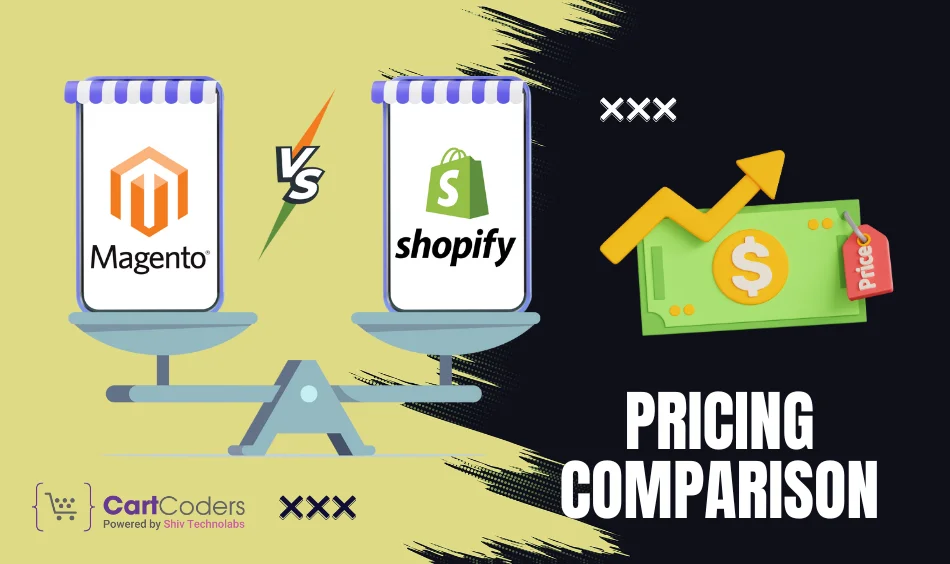Custom Engagement Solutions
Unlock tailored solutions with a free, no-obligation strategy session.
Expert Developers & Engineers on Demand
Scale Your Team with Skilled IT Professionals
Expert Guidance for Digital Transformation

A successful business heavily relies on selecting the appropriate eCommerce platform. The eCommerce platforms Magento and Shopify serve the market with different benefits while requiring distinct attention. A complete guide to these platforms will help you determine which one best matches your business requirements.

The open-source eCommerce software Magento provides users with customization flexibility combined with extensive platform adaptability. The platform presents customers with two different versions: Magento Open Source, which is free, and Magento Commerce, which comes at a paid cost. Businesses with specific needs and technical capabilities find Magento to be their ideal solution.
The Shopify platform provides users with a complete, hosted e-commerce solution, allowing them to manage and set up their online stores on a single platform. The solution operates without complicated requirements, so both entry-level users and small to medium-sized organizations can utilize it without difficulties.
Here’s a detailed comparison of Shopify vs Magento features:
| Feature | Magento | Shopify |
| Hosting | Self-hosted | Hosted by Shopify |
| Ease of Use | Requires technical expertise | User-friendly interface |
| Customization | Highly customizable | Limited customization |
| Themes and Templates | Wide range, requires coding | A variety of ready-to-use themes |
| Extensions and Apps | Extensive marketplace | Large app store |
| SEO Capabilities | Advanced SEO options | Basic SEO features |
| Payment Gateways | Supports numerous gateways | Limited to Shopify Payments and others |
| Support | Community support, paid options | 24/7 customer support |
Let’s look at additional features in detail:
Shopify maintains a reputation for delivering user-friendly interfaces to its customers. Users needing no programming experience can build and handle their businesses through the platform. Users can leverage a selection of themes and drag-and-drop capabilities on this platform to design their stores more efficiently.
Users often face a challenging learning experience with Magento due to its wide range of customization options. Widely known for its ease of use, Shopify enables users to set up their stores using a drag-and-drop interface, but they often need to seek help from developers to manage and modify their stores efficiently.
Magento excels in customization. Businesses can modify their entire store setup by selecting all product-related features because Magento operates as an open-source platform. Businesses having special requirements and implementation resources find this flexibility advantageous.
The Shopify platform enables store customization through its theme editor feature, together with its integration of apps. Shopify offers adequate customization features beyond simplicity, yet allows most organizations to fulfill their requirements at high speed.
For companies expecting future business expansion, Magento offers maximum scalability features. Its design features an architecture that handles big product listings and heavy traffic numbers successfully.
The Shopify Plus plan from Shopify seamlessly supports companies that need to scale their operations, as it is specifically designed for high-volume merchants. Businesses needing scalable solutions should find suitable options through Magento.
The dropshipping model finds its perfect match with Shopify, as it offers the Oberlo and Spocket apps, which streamline product acquisition and order automation. The platform gains popularity among dropshipping businesses due to its easy-to-integrate features.
The process of dropshipping with Magento requires extra technical skills due to its need for extensions for integration, but it still functions as a dropshipping platform.
Through Magento, users gain complete control over their URLs and meta tags, as well as sitemap functionalities for SEO purposes. The advanced level of control through SEO strategies directly benefits companies that make SEO optimization the core of their business operations.
Shopify provides its users with SEO tools, as well as marketing tools that include email marketing and social media integration features. The platform features basic SEO functionality but provides less precise configuration options than Magento.
Using live chat and email, Shopify is ready to offer support services at all times. Shopify provides extensive documentation alongside multiple community forums to help users further.
The support system of Magento depends heavily on its community base but especially for its open-source edition. Magento Commerce offers specific support services for users, although general support may require working with developers and third-party agencies.

Understanding the cost implications is vital when choosing between Magento vs Shopify:
Shopify’s pricing includes hosting, SSL certificates, and other essential features, making it a predictable monthly expense.
Small organizations typically select Shopify because it delivers easy operation and rapid initiation. The system enables business owners who lack extensive technical expertise to build their virtual stores.
Businesses with substantial size and customization requirements should use Magento because it provides complete control over their online stores. The system provides enterprise-level customers with superior flexibility and scalability to meet their complex requirements.
The B2B features of Magento include the ability to create custom pricing structures and run bulk orders, and segment customers into different groups. The platform functions as the preferred B2B choice because of its exceptional capabilities.
Shopify has introduced B2B functionalities, especially with Shopify Plus. While it supports B2B operations, it may not offer the same depth of features as Magento for complex B2B requirements.
The choice between Magento and Shopify depends on your business needs and available resources.
Select Shopify whenever you need a basic platform that installs quickly, since it suits small to medium businesses and dropshippers. The choice should be Magento if you need customizable solutions with high scalability features and advanced B2B processing for organizations that maintain technical support capabilities.
CartCoders adapts eCommerce solutions through specific business designs for each customer. The CarCoders team helps clients develop e-commerce websites and implements Shopify store configurations, as well as adjusts Magento structures.
Ready to elevate your online store? Contact CartCoders today to discuss the best platform for your business.
Projects delivered in 15+ industries.
95% retention rate, building lasting partnerships.
Serving clients across 25+ countries.
60+ pros | 10+ years of experience.